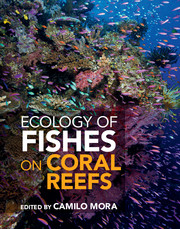Book contents
- Frontmatter
- Contents
- Preface
- Foreword
- List of contributors
- PART I BASIC ECOLOGY
- PART II PATTERNS AND PROCESSES
- PART III HUMAN FINGERPRINTS
- PART IV CONSERVATION
- 18 Resilience in reef fish communities
- 19 Phase shifts and coral reef fishes
- 20 Extinction risk in reef fishes
- 21 A perspective on the management of coral reef fisheries
- 22 Linkages between social systems and coral reefs
- PART V DEBATES AND PARADIGM SHIFTS
- References
- Index
20 - Extinction risk in reef fishes
from PART IV - CONSERVATION
Published online by Cambridge University Press: 05 May 2015
- Frontmatter
- Contents
- Preface
- Foreword
- List of contributors
- PART I BASIC ECOLOGY
- PART II PATTERNS AND PROCESSES
- PART III HUMAN FINGERPRINTS
- PART IV CONSERVATION
- 18 Resilience in reef fish communities
- 19 Phase shifts and coral reef fishes
- 20 Extinction risk in reef fishes
- 21 A perspective on the management of coral reef fisheries
- 22 Linkages between social systems and coral reefs
- PART V DEBATES AND PARADIGM SHIFTS
- References
- Index
Summary
The risk that marine fishes could be driven to extinction by human actions historically has been assumed to be low, as these species often have high fecundities, large dispersal potential, and inhabit areas far from human settlement. However, over the past two decades, research has demonstrated that marine fishes are subject to local, regional, and global extinction. Reef fishes face an elevated risk due to their susceptibility to fishing and the increasing global loss of coral reefs. This chapter synthesizes the current status of knowledge about extinction risk in reef fishes, including differences in conservation status across taxonomic groups, the primary drivers of extinction, and the implications for the future of reef fish communities. To date, more than 1000 reef fish species have been assessed by the International Union for the Conservation of Nature (IUCN) with 8% threatened with extinction. Species-rich families of large-bodied fishes (e.g. Labridae, Epinephelidae) have the highest numbers of threatened species and elasmobranch families have the highest percentage of threatened species, with some families (e.g. Rhynchobatidae, Pristidae) at risk of losing all species [1217]. To date, fishing has been the strongest driver of extinction risk in reef fishes, primarily affecting large-bodied species with slow life histories. However, climate change is an important emerging threat that will first affect habitat specialists, but ultimately alter entire reef fish communities. While extinction risk exists, resilience is conferred by factors such as self-recruitment, depth, and the potential for coral reefs to adapt or migrate over time.
Extinction is characterized by the death of the last individual of a species, and has been the focus of conservation research for decades, as the global extinction of a species can represent an irreversible loss of millions of years of evolved genetic diversity [e.g. 2701]. Local and regional extinction is also of concern, as spatial heterogeneity within populations confers long-term resilience and loss of species can have important ecological consequences [314,1640]. For reef fishes and other species targeted for human consumption, extinction also carries important social consequences.
- Type
- Chapter
- Information
- Ecology of Fishes on Coral Reefs , pp. 199 - 207Publisher: Cambridge University PressPrint publication year: 2015
- 2
- Cited by



